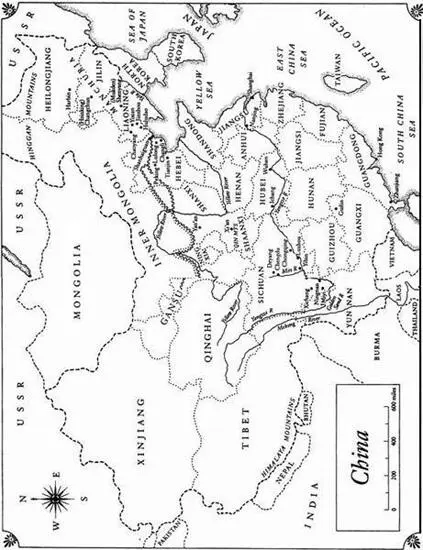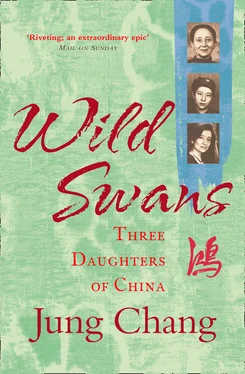

1
‘Three-Inch Golden Lilies’
Concubine to a Warlord General
1909–1933
At the age of fifteen my grandmother became the concubine of a warlord general, the police chief of a tenuous national government of China. The year was 1924 and China was in chaos. Much of it, including Manchuria, where my grandmother lived, was ruled by warlords. The liaison was arranged by her father, a police official in the provincial town of Yixian in southwest Manchuria, about a hundred miles north of the Great Wall and 250 miles northeast of Peking.
Like most towns in China, Yixian was built like a fortress. It was encircled by walls thirty feet high and twelve feet thick dating from the Tang dynasty (AD 618–907), surmounted by battlements, dotted with sixteen forts at regular intervals, and wide enough to ride a horse quite easily along the top. There were four gates into the city, one at each point of the compass, with outer protecting gates, and the fortifications were surrounded by a deep moat.
The town’s most conspicuous feature was a tall, richly decorated bell tower of dark brown stone, which had originally been built in the sixth century when Buddhism had been introduced to the area. Every night the bell was rung to signal the time, and the tower also functioned as a fire and flood alarm. Yixian was a prosperous market town. The plains around produced cotton, maize, sorghum, soybeans, sesame, pears, apples, and grapes. In the grassland areas and in the hills to the west, farmers grazed sheep and cattle.
My great-grandfather, Yang Ru-shan, was born in 1894, when the whole of China was ruled by an emperor who resided in Peking. The imperial family were Manchus who had conquered China in 1644 from Manchuria, which was their base. The Yangs were Han, ethnic Chinese, and had ventured north of the Great Wall in search of opportunity.
My great-grandfather was the only son, which made him of supreme importance to his family. Only a son could perpetuate the family name—without him, the family line would stop, which, to the Chinese, amounted to the greatest possible betrayal of one’s ancestors. He was sent to a good school. The goal was for him to pass the examinations to become a mandarin, an official, which was the aspiration of most Chinese males at the time. Being an official brought power, and power brought money. Without power or money, no Chinese could feel safe from the depredations of officialdom or random violence. There had never been a proper legal system. Justice was arbitrary, and cruelty was both institutionalized and capricious. An official with power was the law. Becoming a mandarin was the only way the child of a non-noble family could escape this cycle of injustice and fear. Yang’s father had decided that his son should not follow him into the family business of felt-making, and sacrificed himself and his family to pay for his son’s education. The women took in sewing for local tailors and dressmakers, toiling late into the night. To save money, they turned their oil lamps down to the absolute minimum, causing lasting damage to their eyes. The joints in their fingers became swollen from the long hours.
Following the custom, my great-grandfather was married young, at fourteen, to a woman six years his senior. It was considered one of the duties of a wife to help bring up her husband.
The story of his wife, my great-grandmother, was typical of millions of Chinese women of her time. She came from a family of tanners called Wu. Because her family was not an intellectual one and did not hold any official post, and because she was a girl, she was not given a name at all. Being the second daughter, she was simply called ‘Number Two Girl’ ( Er-ya-tou ). Her father died when she was an infant, and she was brought up by an uncle. One day, when she was six years old, the uncle was dining with a friend whose wife was pregnant. Over dinner the two men agreed that if the baby was a boy he would be married to the six-year-old niece. The two young people never met before their wedding. In fact, falling in love was considered almost shameful, a family disgrace. Not because it was taboo—there was, after all, a venerable tradition of romantic love in China—but because young people were not supposed to be exposed to situations where such a thing could happen, partly because it was immoral for them to meet, and partly because marriage was seen above all as a duty, an arrangement between two families. With luck, one could fall in love after getting married.
At fourteen, and having lived a very sheltered life, my great-grandfather was little more than a boy at the time of his marriage. On the first night, he did not want to go into the wedding chamber. He went to bed in his mother’s room and had to be carried in to his bride after he fell asleep. But, although he was a spoiled child and still needed help to get dressed, he knew how to ‘plant children’, according to his wife. My grandmother was born within a year of the wedding, on the fifth day of the fifth moon, in early summer 1909. She was in a better position than her mother, for she was actually given a name: Yu-fang. Yu , meaning ‘jade’, was her generation name, given to all the offspring of the same generation, while Fang means ‘fragrant flowers’.
The world she was born into was one of total unpredictability. The Manchu empire, which had ruled China for over 260 years, was tottering. In 1894–95 Japan attacked China in Manchuria, with China suffering devastating defeats and loss of territory. In 1900 the nationalist Boxer Rebellion was put down by eight foreign armies, contingents of which had stayed on, some in Manchuria and some along the Great Wall. Then in 1904–5 Japan and Russia fought a major war on the plains of Manchuria. Japan’s victory made it the dominant outside force in Manchuria. In 1911 the five-year-old emperor of China, Pu Yi, was overthrown and a republic was set up with the charismatic figure of Sun Yat-sen briefly at its head.
The new republican government soon collapsed and the country broke up into fiefs. Manchuria was particularly disaffected from the republic, since the Manchu dynasty had originated there. Foreign powers, especially Japan, intensified their attempts to encroach on the area. Under all these pressures, the old institutions collapsed, resulting in a vacuum of power, morality, and authority. Many people sought to get to the top by bribing local potentates with expensive gifts like gold, silver, and jewellery. My great-grandfather was not rich enough to buy himself a lucrative position in a big city, and by the time he was thirty he had risen no higher than an official in the police station of his native Yixian, a provincial backwater. But he had plans. And he had one valuable asset—his daughter.
My grandmother was a beauty. She had an oval face, with rosy cheeks and lustrous skin. Her long, shiny black hair was woven into a thick plait reaching down to her waist. She could be demure when the occasion demanded, which was most of the time, but underneath her composed exterior she was bursting with suppressed energy. She was petite, about five feet three inches, with a slender figure and sloping shoulders, which were considered the ideal.
But her greatest assets were her bound feet, called in Chinese ‘three-inch golden lilies’ ( san-tsun-gin-lian ). This meant she walked ‘like a tender young willow shoot in a spring breeze’, as Chinese connoisseurs of women traditionally put it. The sight of a woman teetering on bound feet was supposed to have an erotic effect on men, partly because her vulnerability induced a feeling of protectiveness in the onlooker.
Читать дальше














